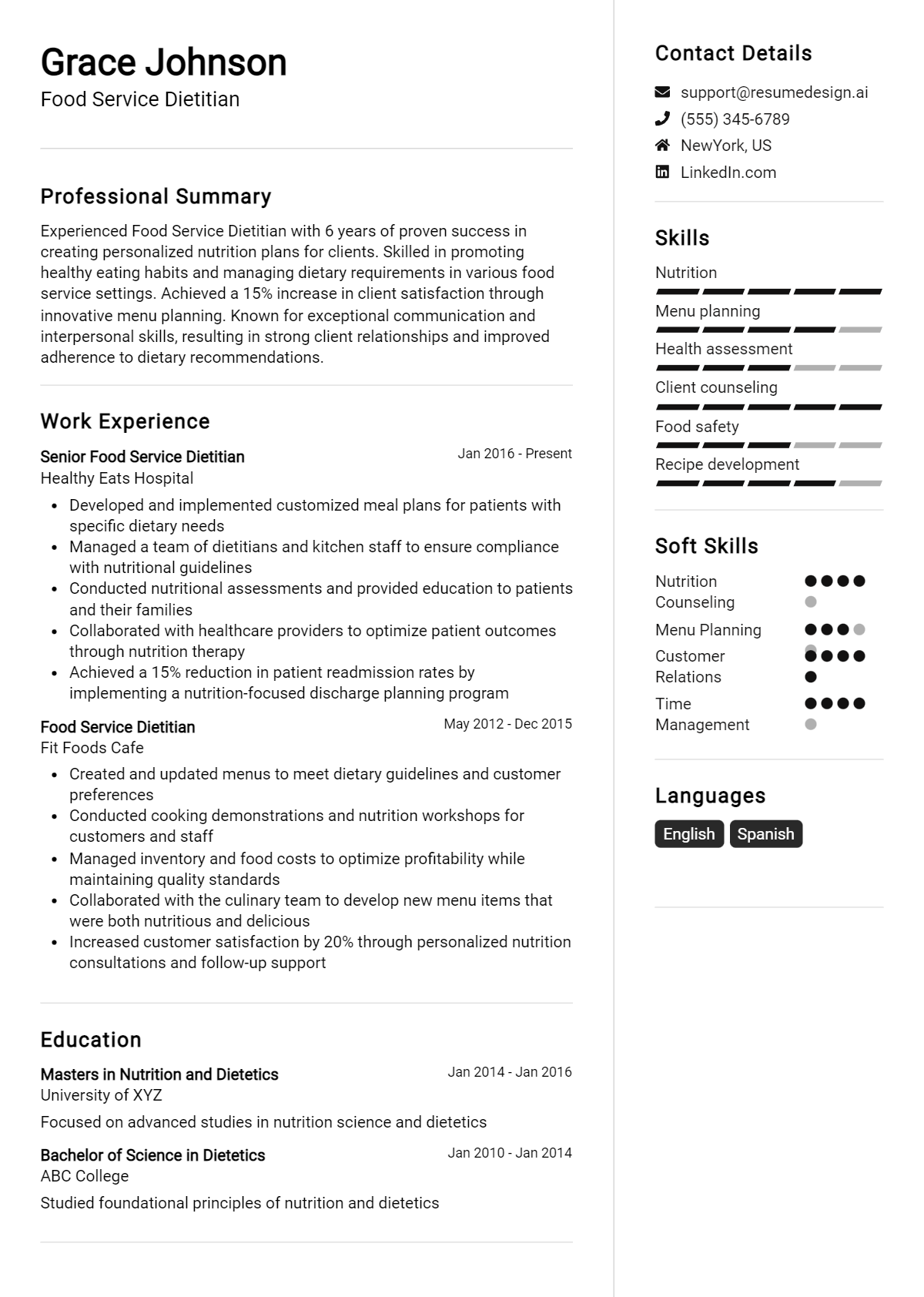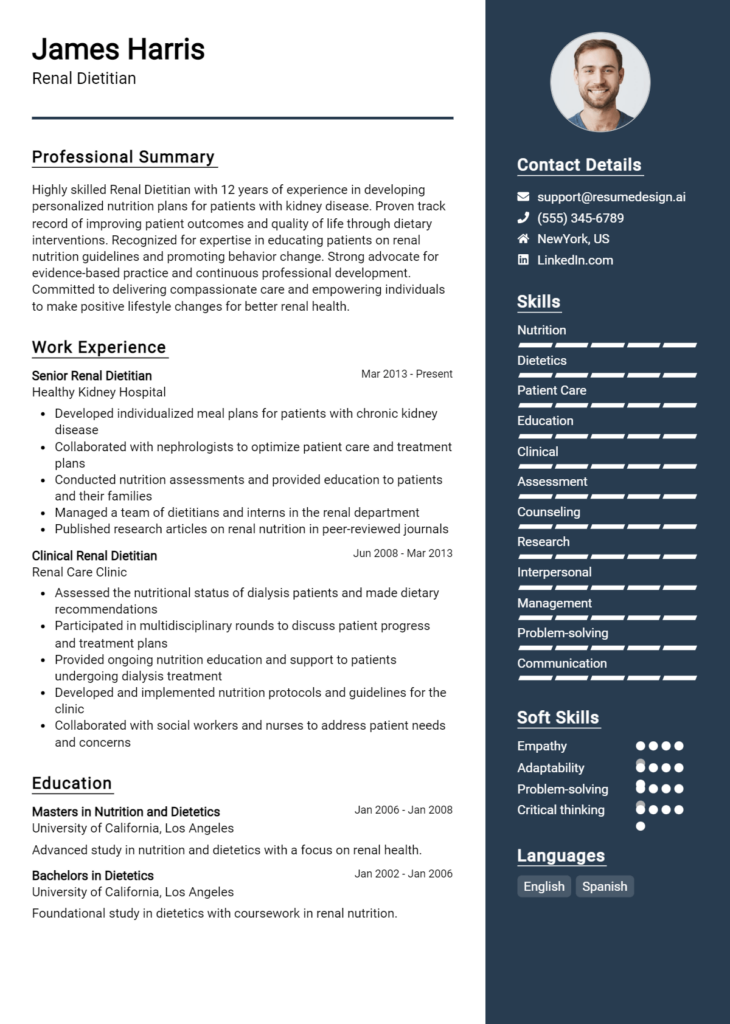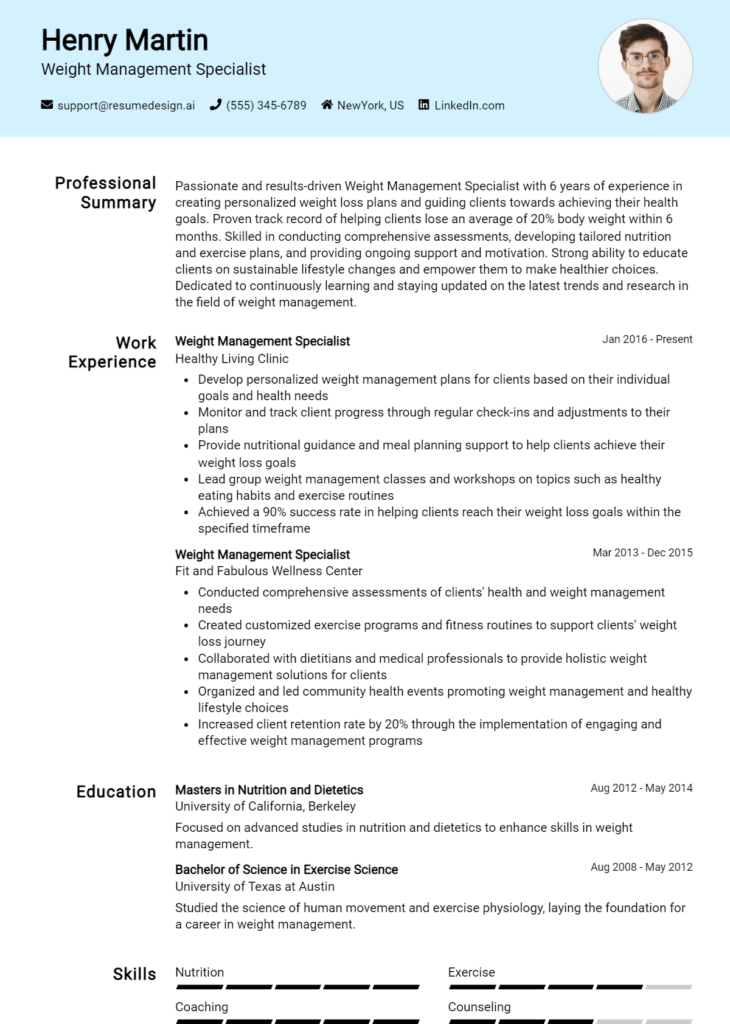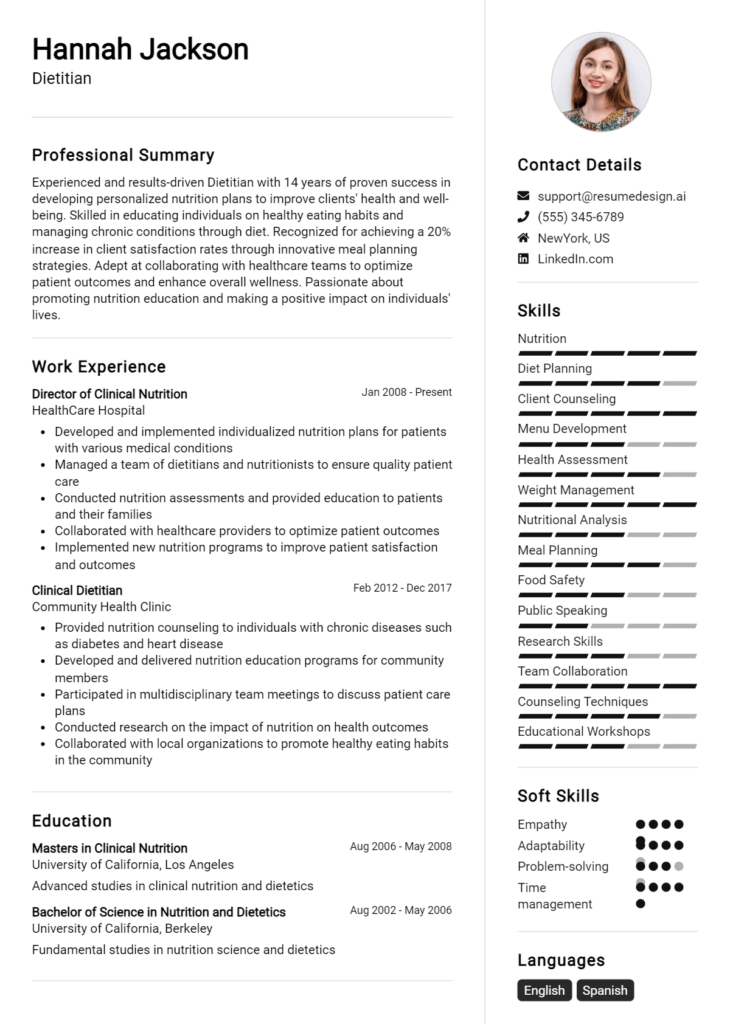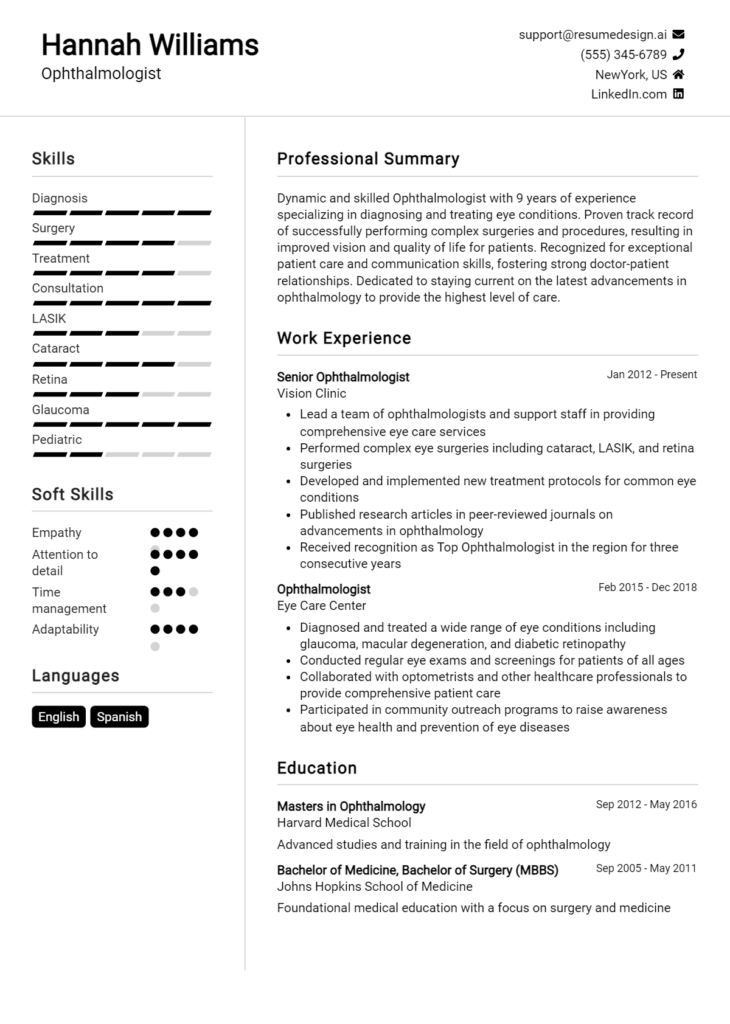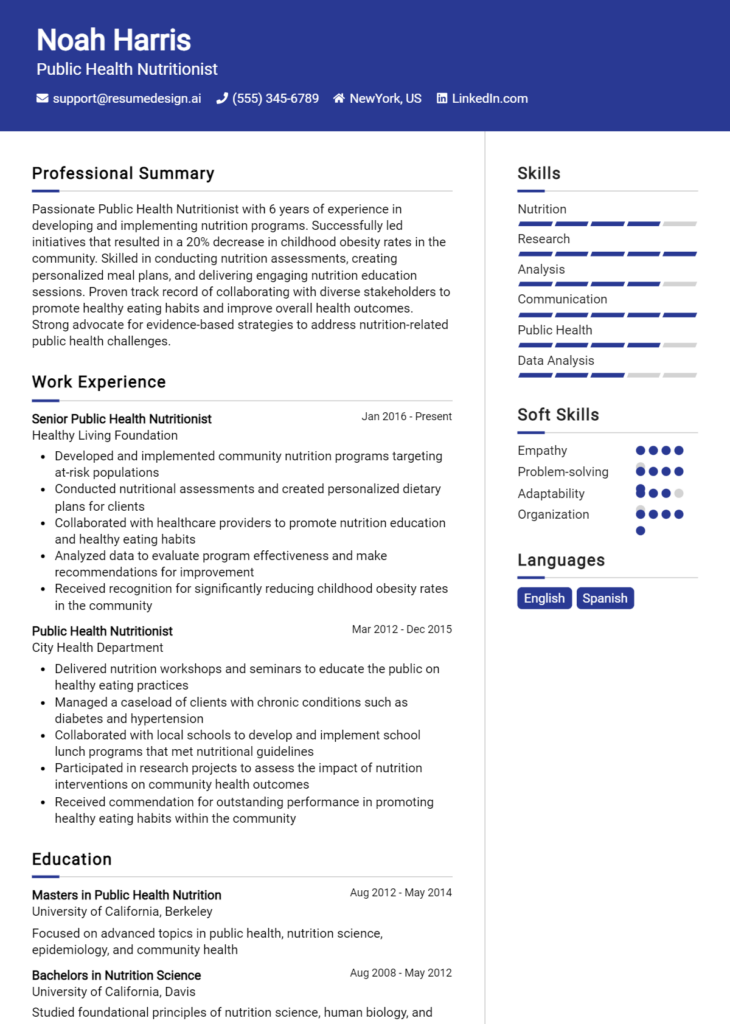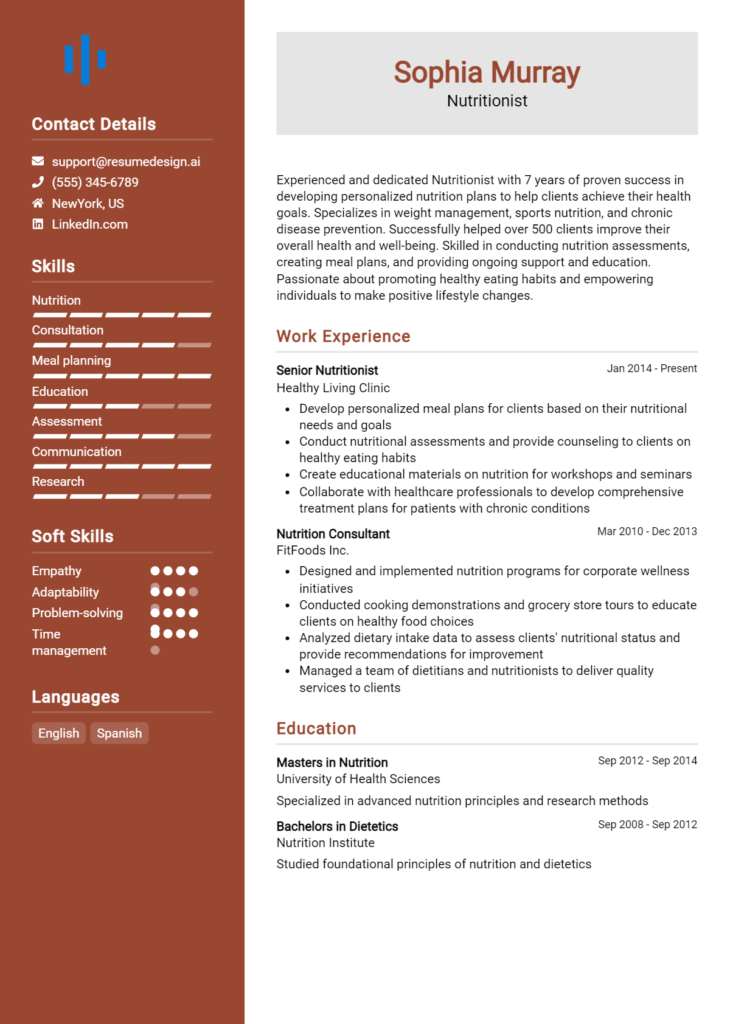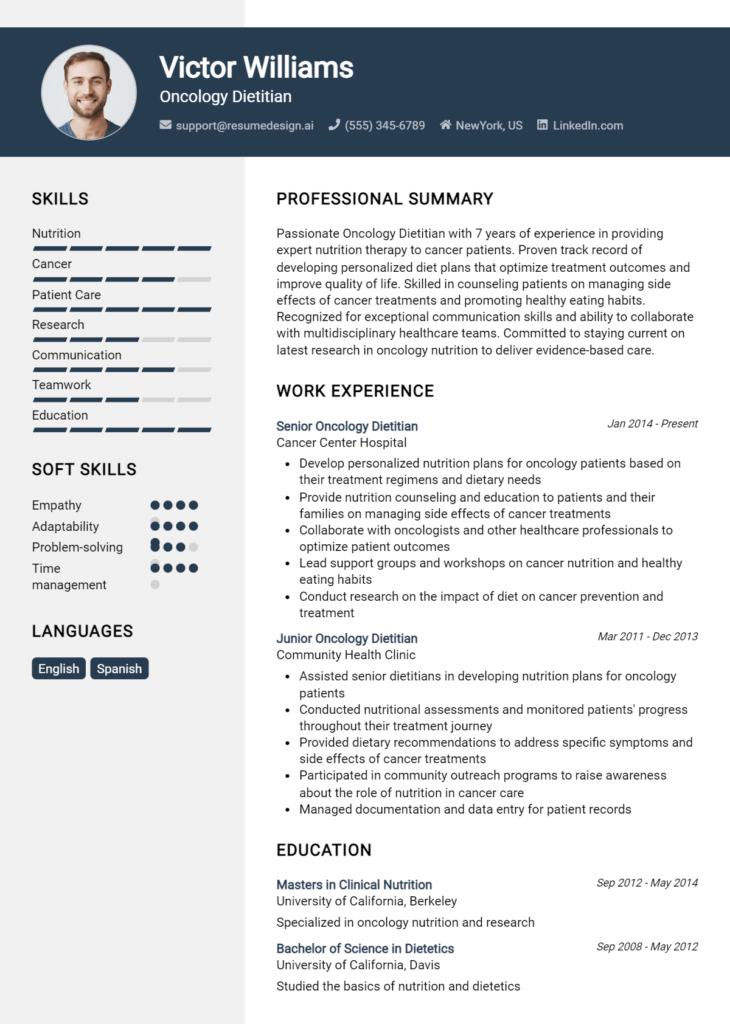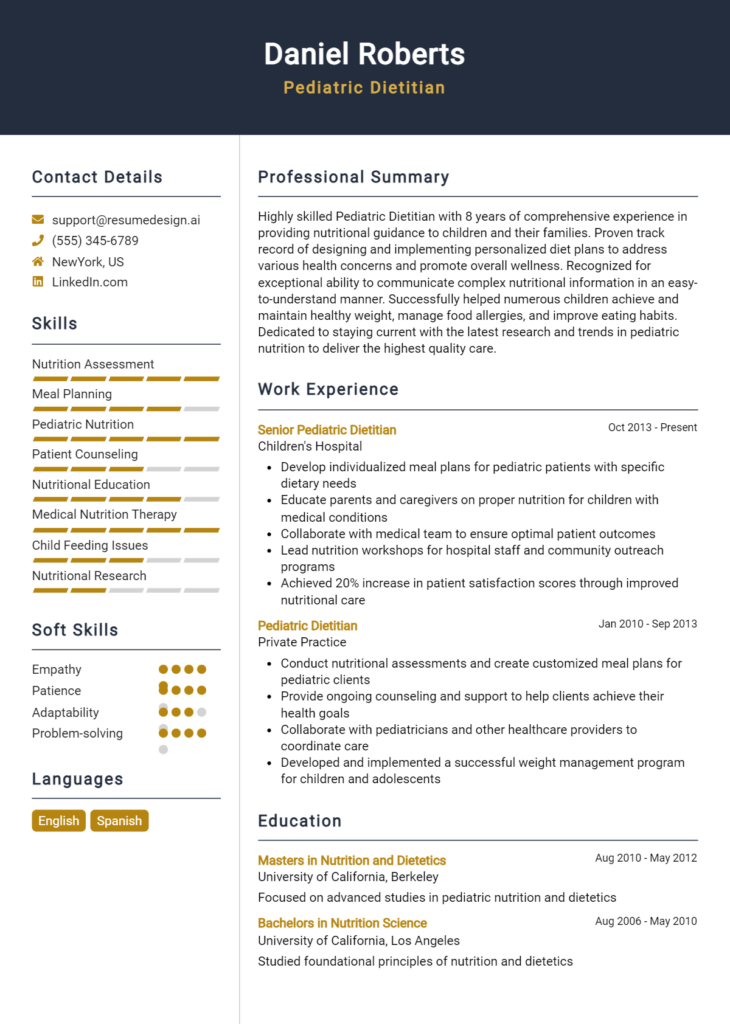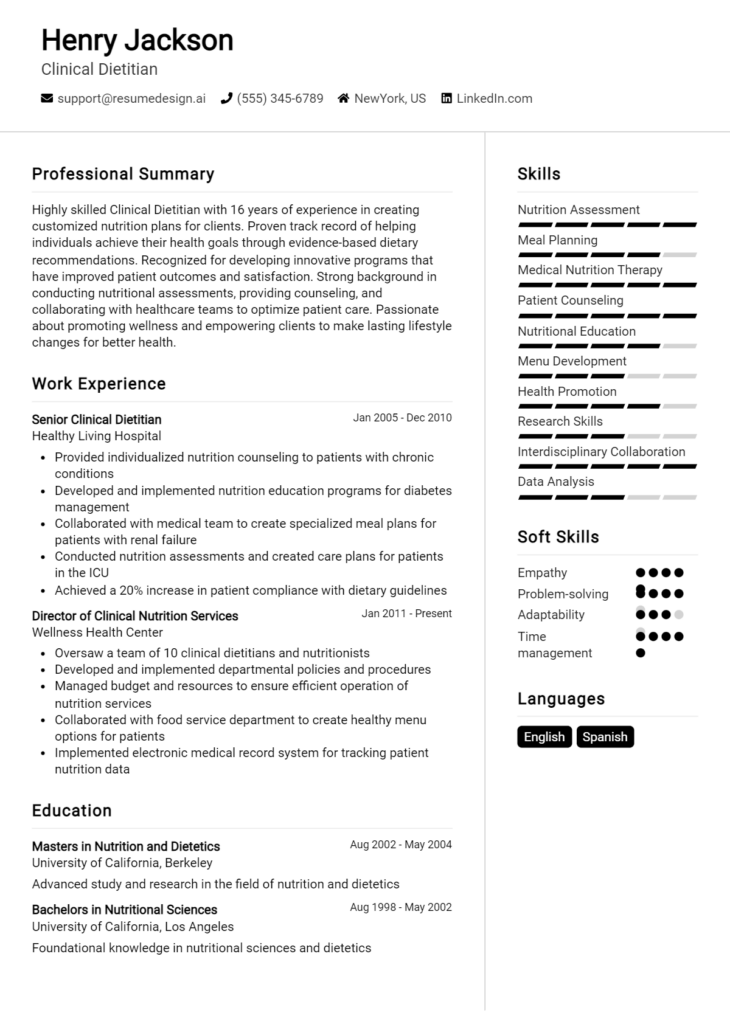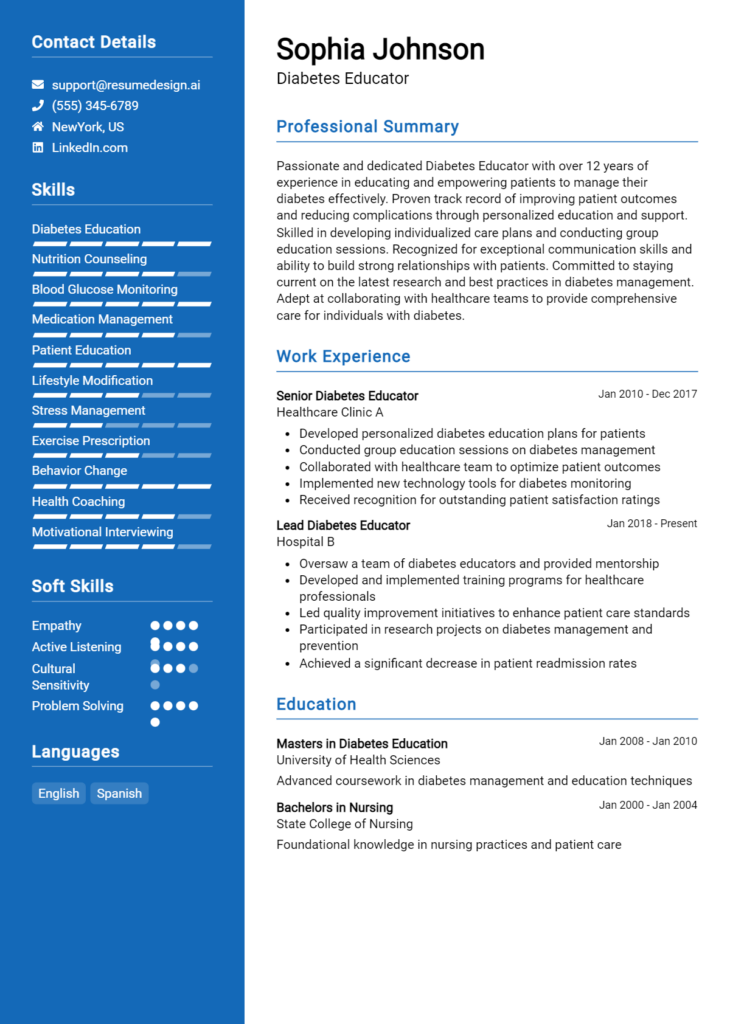Food Service Dietitian Core Responsibilities
A Food Service Dietitian plays a crucial role in managing dietary programs within healthcare settings, schools, or corporate environments, bridging the gap between nutrition science and food service operations. Key responsibilities include menu planning, ensuring food safety standards, and collaborating with chefs and healthcare professionals to meet dietary needs. Essential skills encompass technical knowledge of nutrition, operational management, and problem-solving abilities, which are vital for achieving organizational goals. A well-structured resume can effectively highlight these qualifications, showcasing the candidate's capacity to enhance food service operations and promote optimal health outcomes.
Common Responsibilities Listed on Food Service Dietitian Resume
- Develop and implement nutrition programs and menus.
- Conduct nutritional assessments for patients or clients.
- Ensure compliance with food safety and sanitation regulations.
- Collaborate with kitchen staff to optimize meal preparation.
- Educate staff on nutrition-related topics and dietary guidelines.
- Monitor and evaluate food service operations for quality and efficiency.
- Provide individualized dietary counseling to patients.
- Analyze and manage food service budgets and costs.
- Stay updated on current nutrition research and trends.
- Coordinate with healthcare providers for patient-centered care.
- Lead staff training programs on nutrition and dietetics.
High-Level Resume Tips for Food Service Dietitian Professionals
In the competitive field of food service dietetics, a well-crafted resume is essential for making a lasting first impression on potential employers. Your resume serves as a reflection of your skills, experiences, and achievements, showcasing your qualifications in a way that resonates with hiring managers. For Food Service Dietitian professionals, it's crucial to convey not only your educational background and certifications but also your ability to impact food service operations, nutrition programs, and patient care positively. This guide aims to provide practical and actionable resume tips tailored specifically for Food Service Dietitian professionals, ensuring that your application stands out in a crowded job market.
Top Resume Tips for Food Service Dietitian Professionals
- Tailor your resume to each job description by incorporating relevant keywords and phrases that align with the employer’s needs.
- Highlight your relevant experience in food service management, clinical nutrition, or community outreach to demonstrate your versatility.
- Quantify your achievements, such as improving patient satisfaction scores or reducing food waste percentages, to provide concrete evidence of your impact.
- Showcase industry-specific skills, such as menu planning, food safety regulations, and dietary analysis software proficiency.
- Include certifications like Registered Dietitian Nutritionist (RDN) or Certified Dietary Manager (CDM) to enhance your credibility.
- Utilize a clean, professional format that allows for easy readability and emphasizes key information.
- Incorporate a summary statement at the top of your resume that succinctly captures your career goals and relevant expertise.
- List continuing education courses, workshops, or conferences attended to show your commitment to staying current in the field.
- Utilize strong action verbs in your bullet points to convey your contributions effectively and create a dynamic narrative.
By implementing these tailored resume tips, Food Service Dietitian professionals can significantly enhance their chances of landing a job in this rewarding field. A strategically crafted resume not only showcases your qualifications but also illustrates your dedication to improving health outcomes through effective nutrition management and food service practices.
Why Resume Headlines & Titles are Important for Food Service Dietitian
In the competitive field of food service, a Food Service Dietitian plays a pivotal role in ensuring that nutritional standards are met while meeting the dietary needs of various populations. To stand out in this profession, a resume headline or title is essential as it serves as the first impression a hiring manager has of a candidate. A strong headline encapsulates a candidate's key qualifications in a concise and impactful manner, immediately grabbing the attention of employers. It should be relevant to the job being applied for, reflecting the candidate’s expertise and aligning with the requirements of the position, thereby setting the stage for the rest of the resume.
Best Practices for Crafting Resume Headlines for Food Service Dietitian
- Keep it concise: Aim for one to two impactful phrases.
- Be role-specific: Include terms that directly relate to the Food Service Dietitian position.
- Highlight key skills: Incorporate essential skills that differentiate you from other candidates.
- Use action-oriented language: Begin with strong verbs to convey confidence.
- Tailor for the job: Customize the headline for each specific position you apply for.
- Showcase achievements: If possible, include quantifiable accomplishments that demonstrate your expertise.
- Avoid jargon: Use clear and straightforward language that can be easily understood.
- Stay relevant: Ensure that the headline aligns with the job description and industry standards.
Example Resume Headlines for Food Service Dietitian
Strong Resume Headlines
Results-Driven Food Service Dietitian Specializing in Nutritional Program Development
Certified Nutrition Expert with 5+ Years Experience in Hospital Food Services
Passionate Food Service Dietitian Committed to Enhancing Patient Wellness Through Nutrition
Weak Resume Headlines
Dietitian Looking for a Job
Food Service Professional
The strong resume headlines are effective because they clearly convey the candidate’s unique qualifications and specific expertise related to the Food Service Dietitian role. They utilize action-oriented language and emphasize relevant skills and experiences that align with the job requirements. In contrast, the weak headlines fail to impress as they are vague, lack specificity, and do not highlight any unique attributes or accomplishments, making them easily forgettable in a pool of applicants.
Writing an Exceptional Food Service Dietitian Resume Summary
A well-crafted resume summary is crucial for a Food Service Dietitian as it serves as the first impression a hiring manager will have of a candidate. A strong summary efficiently captures attention by highlighting key skills, relevant experience, and notable accomplishments that align with the job requirements. It acts as a powerful snapshot of the candidate's qualifications, making it easier for employers to quickly assess fit for the role. Therefore, it should be concise, impactful, and tailored specifically to the position being applied for, ensuring it resonates with the employer's needs.
Best Practices for Writing a Food Service Dietitian Resume Summary
- Quantify Achievements: Use numbers and statistics to demonstrate your impact, such as the number of clients served or improvement in patient satisfaction scores.
- Focus on Key Skills: Highlight specific skills relevant to food service and nutrition, such as menu planning, nutritional analysis, and food safety compliance.
- Tailor to Job Description: Customize your summary to reflect the specific requirements and responsibilities listed in the job description.
- Use Action Verbs: Start sentences with strong action verbs to convey confidence and initiative, such as "developed," "implemented," or "led."
- Keep it Concise: Aim for 3-5 sentences that summarize your qualifications without overwhelming the reader.
- Showcase Unique Value: Identify what makes you stand out as a candidate, whether it's specialized training or unique experiences.
- Maintain Professional Tone: Ensure the language is professional and aligns with industry standards to create a credible impression.
- Proofread: Avoid spelling or grammatical errors to maintain a polished and professional appearance.
Example Food Service Dietitian Resume Summaries
Strong Resume Summaries
Results-oriented Food Service Dietitian with over 5 years of experience in developing tailored nutrition programs that improved patient health outcomes by 30%. Skilled in menu planning, dietary assessments, and food service management.
Dedicated Food Service Dietitian with expertise in food safety and nutrition education. Successfully implemented a new patient meal program that increased client satisfaction ratings from 75% to 90% within six months.
Passionate Food Service Dietitian with a proven track record of optimizing food service operations and enhancing nutritional care. Managed a team of 10 in a high-volume healthcare facility, achieving a 20% reduction in food waste while maintaining compliance with health regulations.
Weak Resume Summaries
Food Service Dietitian with experience in nutrition and food service.
I am a dietitian looking for a job in food service where I can use my skills.
The examples above illustrate the distinction between strong and weak resume summaries. Strong summaries effectively highlight quantifiable achievements, specific skills, and direct relevance to the Food Service Dietitian role, making them compelling to hiring managers. In contrast, weak summaries are vague, lack measurable outcomes, and fail to convey the candidate's unique value, rendering them less effective in capturing attention.
Work Experience Section for Food Service Dietitian Resume
The work experience section of a Food Service Dietitian resume is pivotal in demonstrating a candidate's professional journey and expertise. This section not only highlights technical skills relevant to nutritional management and food safety but also showcases the ability to lead and collaborate with diverse teams to deliver high-quality meal programs. By quantifying achievements, such as improved patient satisfaction scores or efficient menu planning, candidates can effectively align their experience with industry standards, making a compelling case for their qualifications in the competitive field of food service nutrition.
Best Practices for Food Service Dietitian Work Experience
- Highlight technical skills relevant to food service operations, including menu planning, nutritional analysis, and food safety compliance.
- Quantify achievements with specific metrics, such as percentage improvements in patient satisfaction or reduction in food waste.
- Showcase leadership experience by detailing roles in team management, training, or project oversight.
- Emphasize collaboration with health care professionals, kitchen staff, and vendors to illustrate teamwork and communication skills.
- Include relevant certifications and training that enhance credibility in food service management.
- Tailor experiences to align with the job description and industry standards in food service and nutrition.
Example Work Experiences for Food Service Dietitian
Strong Experiences
- Led a team of five dietitians to develop and implement a new menu that increased patient satisfaction scores by 25% over six months.
- Managed a food service budget of $500,000 annually, achieving a 15% reduction in food costs while maintaining quality standards.
- Collaborated with nursing staff to create individualized nutrition plans, resulting in a 30% improvement in patient adherence to dietary recommendations.
- Implemented a food safety program that reduced incidents of foodborne illness by 40% within one year.
Weak Experiences
- Assisted with meal planning and other duties in the kitchen.
- Worked on food service-related tasks as needed.
- Helped improve some processes in the food service department.
- Participated in team meetings occasionally.
The examples listed as strong experiences are considered impactful because they provide clear, quantifiable outcomes and demonstrate leadership in managing teams and projects. They highlight the candidate's ability to achieve measurable results while emphasizing collaboration with other health care professionals. In contrast, the weak experiences lack specificity and fail to showcase any significant accomplishments or responsibilities, making them less compelling to potential employers.
Education and Certifications Section for Food Service Dietitian Resume
The education and certifications section of a Food Service Dietitian resume is crucial for demonstrating the candidate's academic qualifications and professional competencies in the field. This section not only showcases the degree(s) earned and relevant coursework but also highlights industry-recognized certifications and ongoing education efforts. By providing detailed information about their educational background and specialized training, candidates can significantly enhance their credibility and demonstrate their commitment to staying current with industry standards and practices, thereby aligning themselves more closely with the job role they seek.
Best Practices for Food Service Dietitian Education and Certifications
- List degrees in nutrition, dietetics, or related fields prominently, starting with the most recent.
- Include relevant certifications such as Registered Dietitian Nutritionist (RDN) or Certified Dietary Manager (CDM).
- Provide details on specialized training programs or workshops related to food service management or nutrition.
- Highlight coursework that directly pertains to food service operations, menu planning, or dietary guidelines.
- Keep the section concise yet informative, ensuring clarity and relevance.
- Stay updated with continuing education credits, showcasing a commitment to lifelong learning.
- Use bullet points for easy readability and to emphasize key qualifications.
- Tailor the content to align with the specific requirements and preferences outlined in the job description.
Example Education and Certifications for Food Service Dietitian
Strong Examples
- Bachelor of Science in Dietetics, University of Nutrition, Graduated May 2020
- Registered Dietitian Nutritionist (RDN), Commission on Dietetic Registration, 2021
- Certificate in Food Service Management, National Restaurant Association, 2022
- Coursework in Menu Planning and Nutrition Analysis, University of Nutrition
Weak Examples
- Bachelor of Arts in History, University of Arts, Graduated 2015
- Certification in Personal Training, Fitness Association, 2019
- Outdated Food Handler’s Card, Expired 2021
- Coursework in General Biology, University of Science
The strong examples listed above are considered effective because they directly relate to the field of food service dietetics, showcasing relevant education and certifications that enhance the candidate's qualifications. In contrast, the weak examples are ineffective as they either pertain to unrelated fields or lack current relevance, failing to demonstrate a solid foundation in dietetics or food service, which is essential for the role of a Food Service Dietitian.
Top Skills & Keywords for Food Service Dietitian Resume
In the competitive field of food service nutrition, having a well-rounded skill set is essential for a Food Service Dietitian to thrive. A resume that highlights both hard and soft skills can significantly enhance a candidate's profile, showcasing their ability to provide effective dietary planning, nutritional education, and support in various food service settings. Employers seek professionals who not only possess technical knowledge but also demonstrate strong interpersonal skills, adaptability, and problem-solving abilities. By emphasizing the right skills in a resume, a Food Service Dietitian can effectively communicate their expertise and readiness for the challenges of the role.
Top Hard & Soft Skills for Food Service Dietitian
Soft Skills
- Excellent communication skills
- Team collaboration and leadership
- Empathy and active listening
- Time management and organization
- Problem-solving and critical thinking
- Cultural competence and sensitivity
- Adaptability and flexibility
- Customer service orientation
- Conflict resolution
- Attention to detail
Hard Skills
- Knowledge of food safety regulations
- Nutritional analysis and meal planning
- Menu development and dietary modification
- Familiarity with dietary guidelines and policies
- Proficiency in food service management software
- Nutritional assessment techniques
- Ability to conduct educational workshops
- Recipe development and standardization
- Knowledge of specialized diets (e.g., diabetic, gluten-free)
- Cost analysis and budgeting for food services
By incorporating a blend of these skills in their resumes, Food Service Dietitians can demonstrate their capability to contribute positively to any food service organization. Additionally, highlighting relevant work experience will further enhance their candidacy, showcasing their practical application of these skills in real-world scenarios.
Stand Out with a Winning Food Service Dietitian Cover Letter
I am excited to apply for the Food Service Dietitian position at [Company Name], as advertised on [Job Board/Company Website]. With a robust background in nutrition and food service management, combined with my passion for promoting healthy eating habits, I am confident in my ability to contribute to your team and enhance the dietary offerings for your clients. My education in dietetics, alongside my hands-on experience in various food service environments, has equipped me with the skills necessary to excel in this role.
In my previous position as a Food Service Dietitian at [Previous Company Name], I successfully developed and implemented nutrition programs that catered to diverse populations, including patients in healthcare facilities and residents in long-term care settings. I utilized my expertise in menu planning to create balanced, appealing meals that not only met dietary guidelines but also considered individual preferences and cultural backgrounds. Collaborating closely with chefs and food service staff, I ensured the delivery of high-quality meals while adhering to food safety regulations and budgetary constraints.
I am particularly drawn to [Company Name] because of its commitment to providing nutritious and delicious meals to its clients. I admire your focus on sustainability and community engagement, and I am eager to contribute my knowledge of nutrition education and food service operations to further these goals. My ability to analyze dietary needs, assess food service systems, and provide training to staff will enable me to positively impact the health and well-being of your clients.
Thank you for considering my application. I look forward to the opportunity to discuss how my experience and passion for nutrition can align with the objectives of [Company Name]. I am eager to bring my expertise in food service and dietetics to your team and contribute to the exceptional services you provide.
Common Mistakes to Avoid in a Food Service Dietitian Resume
When crafting a resume as a Food Service Dietitian, it's essential to present your qualifications and experiences effectively to stand out to potential employers. However, many candidates make common mistakes that can undermine their chances of landing an interview. Avoiding these pitfalls can help ensure that your resume highlights your skills, knowledge, and passion for the field of nutrition and food service management. Here are some of the common mistakes to steer clear of when creating your resume:
Generic Objective Statement: Using a one-size-fits-all objective can make your resume blend in with the rest. Tailor your objective to reflect your specific goals and how they align with the job you’re applying for.
Lack of Relevant Experience: Failing to highlight experience directly related to food service and dietetics can weaken your resume. Always emphasize positions where you've utilized your dietetic skills or worked in food service environments.
Neglecting Certifications: Omitting important certifications, such as Registered Dietitian Nutritionist (RDN) or any specialized training in food service management, can be a major oversight. Ensure all relevant credentials are clearly listed.
Inconsistent Format: A resume that lacks a consistent format regarding font, bullet points, and spacing can appear unprofessional. Stick to a clean and uniform layout for easy readability.
Overly Technical Language: While it’s important to showcase your knowledge, using jargon or overly technical terms can alienate non-specialist reviewers. Aim for clarity and accessibility while still demonstrating expertise.
Ignoring Soft Skills: Food Service Dietitians need strong communication and interpersonal skills. Failing to mention these attributes can downplay your ability to work effectively in team settings or with clients.
Too Much Focus on Duties: Simply listing job duties rather than outcomes or accomplishments can make your resume less impactful. Use quantifiable achievements to illustrate your contributions and successes in previous roles.
Lengthy Resume: A resume that is too long can overwhelm potential employers. Aim for conciseness, focusing on the most relevant experiences and skills that align with the job description.
Conclusion
In conclusion, the role of a Food Service Dietitian is vital in ensuring that nutritional standards are met while promoting health and wellness through food services. Key responsibilities include menu planning, compliance with dietary guidelines, and collaboration with culinary staff to create nutritious meal options that meet the needs of various populations. Understanding the importance of food safety, dietary restrictions, and the latest nutritional science is essential for success in this role.
If you are looking to enhance your career as a Food Service Dietitian, it's a great time to review and revamp your resume. A well-crafted resume can set you apart from other candidates and highlight your qualifications effectively. To assist you in this process, consider utilizing the following resources:
- Explore a variety of resume templates to find a design that suits your style and profession.
- Use our resume builder for an intuitive and user-friendly experience in creating your resume from scratch.
- Check out resume examples to gain inspiration and see how others in your field present their experiences and skills.
- Don’t forget to complement your resume with a strong introduction using our cover letter templates.
Take action today to ensure your resume reflects the best you have to offer as a Food Service Dietitian!

